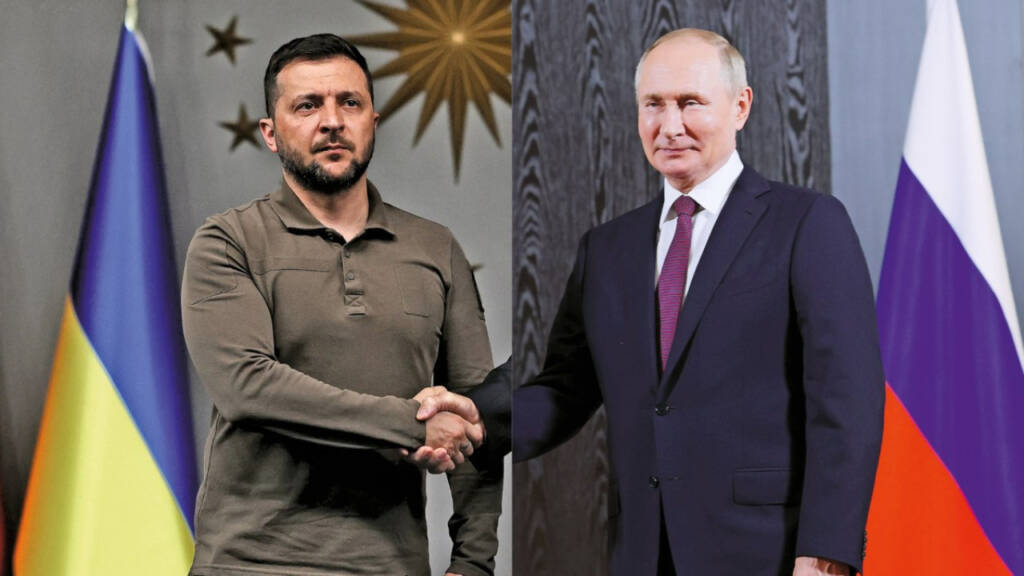In a bold declaration, Russian President Vladimir Putin has asserted the formidable strength of Russia in the enduring conflict with Ukraine, spanning nearly two years. This statement amplifies the urgency of examining the intricacies of the conflict, the motivations behind such a bold assertion, and the potential ramifications for both nations and the broader international community.
Putin issued a stern warning on Tuesday, cautioning Ukraine that if the ongoing conflict persists, it could inflict an “irreparable and very serious blow” to its statehood. Speaking during a televised meeting with Russian municipal leaders, Putin asserted that his forces were prevailing in the war initiated in February 2022. The statement followed Ukrainian President Volodymyr Zelensky’s remarks at the World Economic Forum in Davos, where he maintained his opposition to a ceasefire, emphasizing that only a decisive victory could bring an end to the fighting.
Putin dismissed Ukraine’s counteroffensive launched in June as a failure and asserted that the initiative was now in the hands of the Russian Armed Forces. Expressing strong opposition to peace negotiations that involve territorial concessions, Putin criticized the so-called ‘peace formula’ discussed in the West and Ukraine. He argued that this approach aimed to compel Russia to abandon its territorial gains over the past one and half years, deeming it an impossibility.
Highlighting previous peace talks in Belarus and Turkey during the early weeks of the war, Putin claimed that Ukraine had walked away from a tentative deal, casting blame on British Prime Minister Boris Johnson for persuading them to abandon the agreements. Putin labeled this decision as foolish, suggesting that the conflict could have been resolved 1 1/2 years ago if Ukraine had committed to the proposed agreements.
Read More: Putin Tears Apart West’s ridiculous Ukraine Peace Plan
In addition, Putin addressed recent attacks on Russian territory, denouncing Ukraine for what he alleged were intentional strikes on civilian infrastructure. He accused Kyiv of acting in a barbaric manner, using indiscriminate weapons that targeted peaceful settlements. This exchange of accusations further exemplifies the heightened tensions between the two nations amid the ongoing conflict.
Shortly after Ukrainian President Volodymyr Zelenskyy sought air superiority support from the West during his address at Davos, Russian President Vladimir Putin made these consequential statement.
Join us on Telegram: https://t.me/tfiglobal
Not to mention, for over a year, the frontlines in eastern and southern Ukraine have seen minimal movement, frozen in a state of tension since Russia’s capture of Donbas. In a recent statement, President Vladimir Putin not only dismissed the effectiveness of Ukraine’s counter-offensive but also boldly asserted that Russian forces now hold the strategic initiative in the ongoing conflict. This declaration underscores the complexities and enduring challenges in the region, as the power dynamics remain at an impasse, with both sides locked in a protracted struggle for control.
A wave of controversy washed over Russia as President Putin delivered a fiery speech condemning the recent shelling attack on the city of Belgorod, calling it an “unspeakable act of barbarity” allegedly perpetrated by Ukrainian forces. Over twenty civilians reportedly perished in the attack, leaving the Russian public reeling from the tragedy.
Putin’s rhetoric ignited strong reactions. Those sympathetic to his position echoed his condemnation, pointing to the attack as evidence of Ukrainian disregard for innocent lives and their willingness to escalate the conflict beyond the battlefield.
Beyond the immediate debate, the Belgorod attack and Putin’s response raise crucial questions about the direction of the ongoing conflict. If verified as a Ukrainian attack, it represents a significant departure from their previous focus on military targets and raises concerns about a potential shift towards targeting civilians. Alternatively, if the attack’s origins remain disputed, it becomes another flashpoint in the information war, further eroding trust and hindering any prospects for peace.
One thing is certain: the Belgorod attack has added another layer of complexity to an already volatile situation.
Russia’s special operations in Ukraine, launched in February 2022, triggered a cascade of heavy Western sanctions and substantial military and economic aid to Kyiv. However, the once-flowing assistance has now run dry, altering the dynamics of the ongoing conflict. This shift not only underscores the economic strain on Ukraine but also marks a turning point, as the cessation of aid recalibrates the balance of power in the region.
Read More: “Yes, Yes…I will sign Peace Accord,” Zelensky Crumbles
The consequences of this prolonged strife reverberate far beyond the immediate theater of war, impacting diplomatic relations, international alliances, and the overall stability of the affected regions. The ongoing struggle continues to be a focal point that shapes the geopolitical narrative, prompting nations worldwide to reassess their positions and responses.
Despite the economic challenges and shifting dynamics, Ukrainian President Volodymyr Zelensky persists in seeking support, even making appeals at international forums like Davos. Strikingly, the West continues to back him, showcasing a unique alignment of interests and values. Zelensky’s persistent pleas and the ongoing support from Western nations raise questions about the motivations and strategies underlying this alliance, particularly given the evolving circumstances on the ground.
Considering the challenges faced by Ukraine and the ongoing strain on its leadership, some argue that it might be prudent for other influential players within Ukraine’s power structure to consider alternatives. The suggestion is that removing Zelensky from the equation could potentially salvage whatever remains of Ukraine and offer a chance for recalibration in the face of complex geopolitical realities. This proposition reflects the complexities and divergent opinions surrounding the leadership and future trajectory of Ukraine amidst the ongoing conflict.
Watch More:
